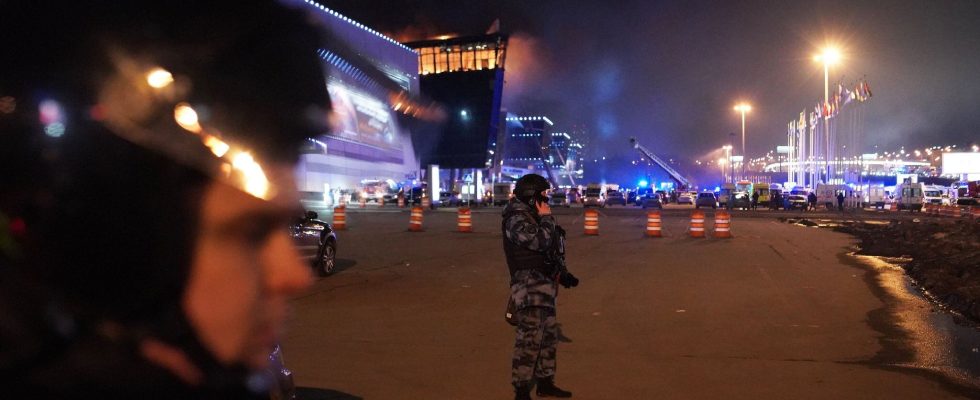Friday March 22, 7 p.m. News of the deadly attack, claimed by the jihadist group Islamic State, on the Crocus City Hall concert hall is making the rounds across Russia. The entire country is following the disaster in real time, to the rhythm of social networks. But already, a question arises: how could the Russian intelligence services allow this attack to occur, even though their control over society is stricter than ever, when they have almost unlimited powers, when the Russian capital is filmed from all angles, 24 hours a day, by a video surveillance system equipped with facial recognition algorithms?
And that, two weeks before the attack, the American services had publicly warned Moscow of the imminence of an “extremist” attack which would target popular sites, particularly concert halls? On his Telegram channel, Ian Matveïev, member of Alexeï Navalny’s team and specialist in security issues, posts this message: “These hordes of cops and spies who announce arrests of ‘terrorists’ every day”, these cameras all over Moscow and this unprecedented level of repression only serve to defend Putin’s power, and absolutely not to protect the country against real threats.”
Top priority of the FSB, Ukraine
Is he right ? For Olivier Mas, former DGSE executive and author of I was someone else and you didn’t know it (editions of the Observatory), the question can actually be asked in these terms. “Certainly, this type of attack is very difficult to counter, he states straight away. Take the Paris attacks: their perpetrators were perfectly identified, followed for months, and despite everything, they were able to cross borders , go under the radar and launch their attack, while Islamist terrorism was the number one concern of French intelligence.” But was it, in recent months, that of the Russian security services? Nothing is less certain, he continues.
“Their ultimate priority is the war in Ukraine. The means of interception and translation are limited, even in a large service. The resources allocated to Ukraine are therefore not elsewhere…” The independent Russian newspaper Novaya Gazeta Europe also noted an eloquent statistic. Since the start of the invasion on February 24, 2022, the FSB says it has foiled more than 100 attacks. 76 of them were attributed to Ukrainian services. Between 2013 and 2022, conversely, almost all of the FSB’s anti-terrorist activity concerned Islamist circles in the Russian Caucasus.
“The special services no longer function as they did before the Russo-Ukrainian war,” confirms Irina Borogan, Russian intelligence expert and co-author ofExiles, émigrés and Russian agents, a chaotic history (ed. Gallimard). They have new missions. There is an immense amount of prisoners of war to manage and interrogate. Without forgetting the population of the annexed territories, who must be “filtered” and questioned, in order to identify those who have sympathies for Ukraine, or even collaborate with its army… This mobilizes enormous resources.”
The increasingly open antagonism between Russia and Western countries also explains, in part, the failure of Russian intelligence: “To know that attacks are going to occur, you have to collaborate with foreign services, because no one can monitor the entire planet, she continues. However, the channels for exchanging information are clearly functioning less well. There is no longer any mutual trust [entre les services russes et occidentaux] since the beginning of the war.”
Another target: political opponents
A final reason can explain this failure: the rise in power of another traditional mission of the Russian services, namely the surveillance and repression of their own population. “Monitoring dissidents and social networks has always been part of the FSB’s daily life, explains Irina Borogan. But since the start of the war, it has been on an unprecedented scale. The investigators no longer do anything other than look for “extremists”. A term to be understood in the new meaning given to it by the Kremlin: any person declaring their opposition to the war in Ukraine, their support for the opposition or having called for go vote at noon sharp on Sunday, March 17, for the presidential election.
“Dealing with this kind of case is much easier than catching real terrorists,” quips the expert. The services devote enormous resources to it, especially during an election period. The number one objective, on March 17, was that everything is going well, that no one is demonstrating… Obviously, they have abandoned their work on the clandestine Islamist movement.”
.
